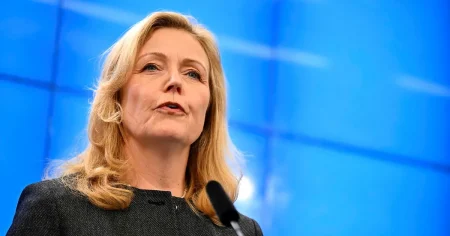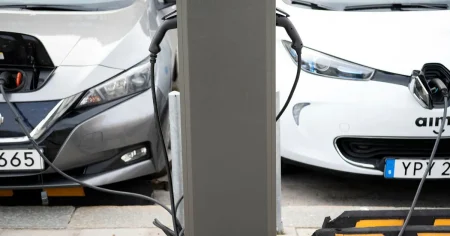The Russian invasion of Ukraine has dramatically reshaped the European security landscape, prompting urgent discussions about bolstering defense capabilities and re-evaluating budgetary priorities. A key theme emerging from these discussions is the imperative for Europe to assume greater responsibility for its own security, a sentiment echoed by Swedish Prime Minister Ulf Kristersson. This newfound urgency has sparked debate on how to finance the necessary investments in defense, with the European Union exploring various avenues for resource allocation and budgetary adjustments. The central question revolves around how to effectively balance existing financial commitments with the pressing need for increased defense spending in a rapidly evolving geopolitical environment. One proposed solution involves re-directing funds originally earmarked for regional development towards defense initiatives, a move that has generated both interest and controversy.
The European Commission, the executive branch of the EU, is under pressure to propose concrete measures for financing defense investments. While some member states advocate for creating new funding streams, others, including Sweden, prefer to re-prioritize existing resources, emphasizing the importance of fiscal restraint. One potential source of funding is the EU’s regional development budget, the largest single expenditure item within the EU budget. This funding is traditionally allocated to reduce economic disparities between regions, but the idea of diverting a portion of it to defense has gained traction in the wake of the Ukraine war. Proponents argue that such a redirection would not necessitate new expenditures, aligning with the principle of budgetary prudence while addressing critical security needs. However, concerns remain about the potential impact on regional development projects and the need for a careful balancing act.
The debate over utilizing regional development funds for defense hinges on the argument of flexibility within the existing framework. The European Commission maintains that the current regulations already offer sufficient leeway for member states to allocate regional funds towards defense-related purposes, such as creating jobs in the defense industry or improving infrastructure to support military transport. This perspective emphasizes the potential for dual-use investments, where projects can serve both civilian and military needs. For example, upgrading roads and bridges, ostensibly for economic development, could simultaneously enhance the mobility of military vehicles. This argument seeks to minimize disruptions to existing regional development plans while accommodating the increased demand for defense spending.
Finland’s former President, Sauli Niinistö, has contributed to the discussion with a report on the EU’s crisis preparedness. He recommends dedicating a significant portion, 20%, of the EU budget to defense and crisis management. While this proposal has generated discussion, opinions vary on the appropriate level of defense spending. The EU’s upcoming multiannual budget framework, expected next year, will be a crucial determinant in shaping future defense investments. The budget will need to address not only the immediate security concerns but also the potential financial implications of EU expansion, with Ukraine and Moldova currently in accession talks. Balancing these diverse demands will require careful consideration and potentially difficult choices.
The evolving security landscape necessitates a comprehensive approach to EU budgeting, encompassing not only defense expenditures but also support for Ukraine and potential future member states. The EU has pledged continued support for Ukraine, with member states actively seeking ways to increase their contributions. However, disparities exist in the level of support provided by different member states, raising questions about equitable burden-sharing. Encouraging greater participation in supporting Ukraine requires sustained dialogue and demonstrable commitment from all member states. Maintaining a united front in supporting Ukraine is crucial, as wavering support within Europe could embolden Russia and potentially influence the commitment of other international partners.
The discourse on European defense and security funding highlights the complex interplay of competing priorities and the challenge of allocating limited resources effectively. The debate underscores the need for a nuanced approach that simultaneously addresses immediate security concerns, long-term budgetary stability, and the potential for future EU expansion. Striking the right balance will be crucial for ensuring Europe’s security and stability in a volatile geopolitical environment. The decisions made in the upcoming budget negotiations will have far-reaching consequences, shaping the EU’s ability to respond to future challenges and maintain its commitment to supporting its partners and potential future members.














